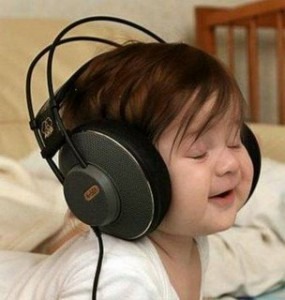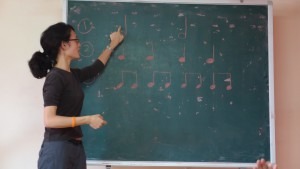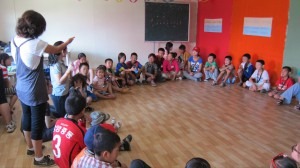 Can one cook an authentic Chinese meal without ever having had a taste of the cuisine?
Can one cook an authentic Chinese meal without ever having had a taste of the cuisine?
It would be safe to say that the above would prove extremely tricky. As with most other things in life, it is hard to successfully replicate something without having experienced it one way or another.
This is unfortunately precisely what I find disturbing about music education in Hong Kong. It seems that most students here learn at least one musical instrument, but it appears that they seldom sit down to listen to a piece of music, let alone attend concerts. We live in such a goal-driven, fast-paced society that we rarely do things for pure pleasure anymore, let alone have quiet time to think and reflect. There is always a reason or motive behind what we do. Yes, I agree that often the pleasure derives from a self-fulfilling goal – we like the things we are best at and in turn we perform better in things that we like – but when we remove the ‘we’ from the equation, do we still enjoy the subject or activity in question?
Sometimes it is impossible to remove the ‘we’. As a musician myself, I do not know whether I enjoy listening or playing more. However, I am more drawn to music written for piano, whether in the form of solo or chamber works. The only explanation I can really come up with this, is that every time I listen to a piece that includes the piano, I can imagine myself playing the piano part, and find that I am either inspired by the pianist who is playing, or frantically thinking of other ways of interpreting the piece. In other words, I live vicariously through the pianist, and as a result feel a higher level of enjoyment and excitement.
 But I digress. This article is mainly about the necessity of experiencing something before reproducing it, thus it begs the question, how does one experience music? Now I hope the first word to come to mind is ‘LISTEN!’ Listening should begin at home and from a young age, whether it be listening to music in the car or at home. It also helps to be more aware of sounds around you, as music (strictly defined as ‘organised sound’) is literally heard everywhere. Airport announcements are often initiated by the sound of a broken chord; Cantonese pronunciation is governed by tones: for example, the word for thank you, ‘ng goi’, is a rising perfect fifth!
But I digress. This article is mainly about the necessity of experiencing something before reproducing it, thus it begs the question, how does one experience music? Now I hope the first word to come to mind is ‘LISTEN!’ Listening should begin at home and from a young age, whether it be listening to music in the car or at home. It also helps to be more aware of sounds around you, as music (strictly defined as ‘organised sound’) is literally heard everywhere. Airport announcements are often initiated by the sound of a broken chord; Cantonese pronunciation is governed by tones: for example, the word for thank you, ‘ng goi’, is a rising perfect fifth!
The next level up – and this would be a great family activity – is to spend some time every week listening to a piece of music together, and then discussing it. It does not have to be technical, but it should initiate a sharing of what each person’s take on the piece is. One can talk about the different instruments in the piece and their respective timbre or tone colour (bright vs muted etc), the speed, style (march vs dance etc), or texture (thin with just a couple of instruments or thick with a full orchestra) etc…
The above is basically the premise of the ABRSM Aural Tests – to promote an aural, rather than practical or theoretical, understanding of music, because music is evidently experienced through our ears! These tests, along with the sight-reading tests, help determine how all-rounded a candidate’s musical education should be, and preparation for these undoubtedly help shape a candidate’s general musicianship, which acts as the foundation of one’s music appreciation in later life when instrumental lessons have long ended. However, the aural and sight-reading tests are often the parts of the exam that most students dread, because the skills required needs time to develop.
 The ABRSM expects candidates to build on their repertoire and develop note-reading and aural understanding skills gradually, in between taking exams, but this of course causes problems when in reality kids jump many grades (mostly to ‘get that certificate in order to…’) and some focus solely on learning exam pieces, which means there is no room for transition and development between the grades. Sight-reading will evidently become easier if a child spends time learning more new pieces (and hence getting used to reading scores) rather than perfecting one difficult piece, which he/she is likely to be playing either by ear or from memory eventually.
The ABRSM expects candidates to build on their repertoire and develop note-reading and aural understanding skills gradually, in between taking exams, but this of course causes problems when in reality kids jump many grades (mostly to ‘get that certificate in order to…’) and some focus solely on learning exam pieces, which means there is no room for transition and development between the grades. Sight-reading will evidently become easier if a child spends time learning more new pieces (and hence getting used to reading scores) rather than perfecting one difficult piece, which he/she is likely to be playing either by ear or from memory eventually.
Schools do not usually allow students to skip grades so easily, let alone skipping two or three grades at a time, so why is that somehow the ‘natural progression’ when it comes to music exams? Is learning an instrument really just about getting a certificate to use as a stepping-stone for something else? Is the point about getting a pass at Grade 8 as young as possible? What happened to the real purpose of education?
Happiness is after all not a destination but the journey itself. How can we cultivate an interest in music in the next generation if society encourages them to take big shortcuts during their short-lived musical education?
More Society
-
 Will Trump’s Tariffs Destroy Music Education in America? We look at how the trade war matters to beginning students and more
Will Trump’s Tariffs Destroy Music Education in America? We look at how the trade war matters to beginning students and more -
 Forbidden Harmonies: Composers Whose Music Was Once Banned Discover these stories of musical resistance
Forbidden Harmonies: Composers Whose Music Was Once Banned Discover these stories of musical resistance -
 Nixon in China February 21, 1972: 'The week that changed the world'
Nixon in China February 21, 1972: 'The week that changed the world' -
 Manchester Camerata to Host the UK’s First Centre of Excellence for Music and Dementia "It's really changed how we view music and what it can do for people"
Manchester Camerata to Host the UK’s First Centre of Excellence for Music and Dementia "It's really changed how we view music and what it can do for people"





Nicolette,
Your article is outstanding!
It’s not only in Hong Kong that music students learn to play their instruments very well, but attend concerts infrequently. Your thought: “This article is mainly about the necessity of experiencing something before reproducing it, thus it begs the question, how does one experience music? Now I hope the first word to come to mind is ‘LISTEN!’” Indeed, how can one hope to reproduce music before having an aural understanding of it?
And what about music listening as a consciously chosen behavior in and of itself – just for the sheer pleasure and emotional meaning it can have for us? At The Discovery Orchestra we have made the encouragement of listening our primary mission. Perhaps you might find our website’s offerings: http://bit.ly/10WT5V7 and our television shows bit.ly/174pAJf of interest. I hope your students know how lucky they are!
George Marriner Maull
Artistic Director
The Discovery Orchestra